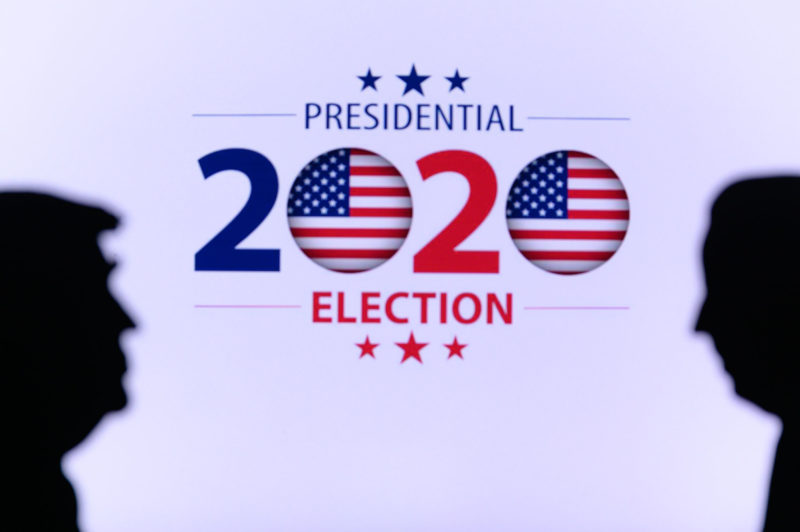
Joe Biden’s vast foreign policy experience will give him the tools to demonstrate his ambition for the international leadership that has been missing in the last four years.
With less than 80 days until the US presidential election, poll numbers suggest that Donald Trump’s popularity is declining, whereas the chances of witnessing a power shift are increasing.
The way President Trump has handled the COVID-19 pandemic has significantly impacted his reelection prospects. The US is the most affected country in the world; unemployment was at a record high of 14.7 per cent in April, and the US is dealing with its worst economic recession since the Great Depression. Furthermore, the killing of George Floyd has sparked unprecedented protests across America.
Joe Biden’s polling numbers are high, and most importantly, they are high in battleground states. He is leading in the blue wall states of Michigan, Wisconsin and Pennsylvania, states which Hillary Clinton lost in the 2016 election.
He even stands a chance in solidly Republican states such as Arizona, Georgia and Texas. Thus, the estimated chances of Biden winning the US presidential election are rising significantly.
A Biden victory would mean fundamental changes to US foreign policy. The Balkan states have been witnessing a deterioration in democratic standards, a surge in authoritarian external influences and the lack of a final solution between Kosovo-Serbia, which continues to pose a challenge for regional stability.
A paradigm shift in US foreign policy?
Joe Biden has positioned himself as the most knowledgeable candidate in foreign policy. With a wealth of experience under his belt, he not only has the necessary diplomacy and negotiation skills, but the lessons learned from his failures that will guide him in the next administration.
While it is impossible to forecast Biden’s foreign policy plans as that would depend on several factors and trends, we can make predictions based on his track record.
He served as Vice President for two full terms under the Obama Administration and in the US Senate for three decades, where he was engaged in the Foreign Relations Committee.
He supported the military intervention against Serbia, voted in favour of the Iraq War, argued against the surge in Afghanistan and was against intervention in Syria. More recently, he argued for an increased presence of US troops in Eastern Europe to check Russia and criticised Trump’s decision to withdraw US troops from Germany.
Biden and President Trump have diametrically opposing views. Biden is a strong advocate of US exceptionalism but also believes in close cooperation with allies and international support. He is a proponent of global leadership and wants the US to maintain its security commitments and relationships with allies, which have been diminishing under the Trump administration.
B for Balkans
Biden’s three main foreign policy pillars tend to be: alliances, Russia, and China. In the Balkans, we can expect that Biden will focus on restoring America’s role in the region, thwarting China’s and Russia’s authoritarian influence and helping finalise a deal between Kosovo-Serbia.
Biden was in favour of the US intervention during the war in Bosnia and Herzegovina and later in Kosovo to halt genocide and ethnic cleansing. His son Beau Biden, a veteran of the US Army, served in Kosovo as a member of the US Department of Justice to help advance justice and the rule of law. He helped train local prosecutors and judges for the Organisation for Security and Cooperation in Europe (OSCE). Beau passed away at the age of 46 from cancer.
Biden visited the region, at the beginning and at the end of his mandate as Vice President to promote reconciliation between Kosovo and Serbia. He was also present for the inaugural ceremony of a Kosovo street named after his late son Beau Biden.
During an interview for NBC in January, following the assassination of Iranian General Qaseem Soleimani, Biden was asked about why his judgment should be valued. In response, he said, “Look, I’m the guy that started the effort to make sure we took down the guy who was engaged in genocide in the Balkans: Slobodan Milosevic.”
While he may exaggerate the role that he played during the Bosnian war (he was one of many co-sponsors of the bill pushing for US intervention), Biden does have experience and an interest in this region of Europe. The reference that Biden made exhibits that he is proud of his efforts in maintaining peace in the Balkans.
Biden is aware that finalising a deal between Kosovo and Serbia will pave the way for sustainable cooperation and development in the region. A solution to the so-called Gordian Knot of the Balkans will not be found in a matter of weeks. Quick foreign policy deals such as the one that Trump and US envoy for the Kosovo-Serbia dialogue Richard Grenell have been pushing for are not sustainable.
Biden is committed to maintaining US involvement in the region and will choose a credible envoy; someone who is experienced in the Balkans or has the relevant negotiating skills.
Counterbalancing China and Russia
Russia was always perceived as the main power competition in the region, considering its political interests as well as cultural ties with Slavic and orthodox countries. The West has paid close attention to the Kremlin’s political manoeuvres and investments.
However, Russia’s influence is becoming limited because of the rise of China, which has left a big mark on the Balkans. China has been investing millions in infrastructure and telecommunication projects, taking advantage of the poor investment climate in the Balkans.
Among all Balkan countries, Serbia maintains the most bilateral cooperation with both China and Russia. Serbia purchases sophisticated weapons and military equipment from the two countries and puts up billboards in the streets of Belgrade thanking China and Russia, and refers to Chinese and Russian leaders as “brothers”.
One way a Biden presidency could counterbalance this influence is by ensuring that EU integration for the remaining Balkan states is on track. Despite increased EU scepticism in the region, strong US leadership can directly impact the improvement of their rule of law and democratic standards, which have been eroding in Montenegro and Serbia especially, the so-called front runners of EU integration.
The Biden administration should focus on building extensive economic cooperation in the Balkans through the “mini-Schengen” initiative. This is especially crucial considering the toll that COVID-19 has taken on the region. More cooperation can boost economic recovery and strengthen its attractiveness for foreign investors.
Two decades after the last war in Yugoslavia, the Balkans remains a fragile region. It is full of uncertainties and reconciliation that is still needed. The Balkans needs continuous guidance from the West.
Biden’s vast foreign policy experience will give him the tools to demonstrate his ambition for the international leadership that has been missing in the last four years. If Biden wants to display his foreign policy skills, the Balkans is the right place to deliver.
Visar Xhambazi is a policy researcher at Democracy for Development (D4D) Institute and a Young Professional Advisor at United Europe. He holds a master’s degree in International Studies from Old Dominion University in Virginia, specialising in US foreign policy and international relations.
The article was first published by Visegrad Insight.



